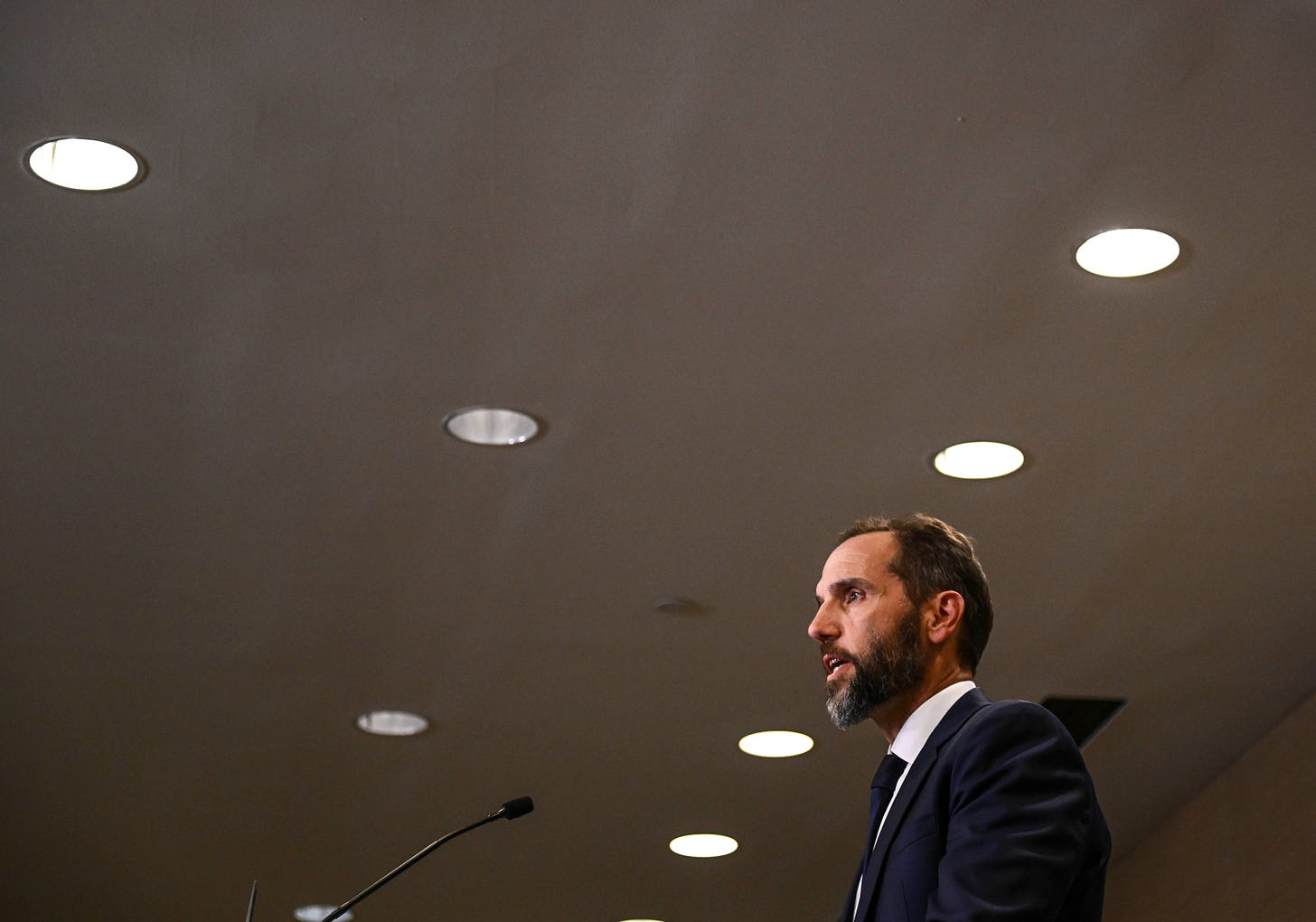
Jack Smith’s Hard Choices
His prosecution of Donald Trump is coming into its last days and hours. What options are left?

IN JUST OVER TWO MONTHS, Donald J. Trump will control the entire executive branch of the national government. His allies will control at least one house of Congress, likely both. The Supreme Court is tilted in his direction. Aware of this, Special Counsel Jack Smith now must decide how to wind up what is in all likelihood the last (and first) prosecution of a former president for violations of federal criminal law.
And it’s not just logistics that Smith must think about. He must think about the legacy of the U.S. Constitution itself.
As a reminder: Four criminal indictments were handed down against Donald Trump last year, two at the federal level, two at the state level. The only case to have reached trial was his prosecution in Manhattan for falsifying business records as part of a 2020 campaign coverup. In that case, he was found guilty this past May of 34 felony charges. Justice Juan Merchan is scheduled to decide this week whether the conviction can stand—not because of Trump’s election, but because of the U.S. Supreme Court’s breathtaking ruling in Trump v. United States last summer that presidents enjoy wide immunity from criminal prosecution. Trump was scheduled for sentencing on November 26 in the case; it is unclear what will become of it.
In Georgia, Fulton County District Attorney Fani Willis was re-elected last week. Her case against Trump for interfering in the 2020 election in Georgia has slowed to a standstill because of legal maneuvers—including motions to dismiss arising from a personal relationship she had with a colleague—and the twin facts of the Supreme Court’s ruling and Trump’s election now leave the future of the case in doubt.
In the federal case in Florida relating to classified documents that Trump illegally kept after leaving the White House, U.S. District Judge Aileen Cannon, a Trump appointee and unabashed political loyalist, already dismissed the case on the silly grounds that Smith was unconstitutionally appointed. That ruling is on appeal to the U.S. Court of Appeals for the Eleventh Circuit, which is expected to reverse it given the major flaws in Cannon’s reasoning. But for now, the case is dead.
Which leaves Smith’s other case, the big one: the prosecution of Trump for his attempts to overturn the 2020 election, including the January 6th attack on the Capitol. This past Friday, Smith filed papers with U.S. District Judge Tanya Chutkan stating that “as a result of the election” he “respectfully requests that the Court vacate the remaining deadlines in the pretrial schedule to afford the Government time to assess this unprecedented circumstance.” Chutkan immediately granted Smith’s request. “By December 2, 2024, the Government will file a status report or otherwise inform the Court of the result of its deliberations,” Smith said.
The case remains mired in litigation over how to parse Trump v. U.S., which created criminal immunity for presidents so long as they commit crimes with official presidential power that falls within the outer boundaries of Article II of the Constitution. Unless the decision is overruled by a new Supreme Court majority or a constitutional amendment (neither of which are conceivable), it effectively means that, from President Joe Biden onward, no president will ever face the prospect of criminal liability for crimes they commit in office.
Which also means that, moving forward, presidents have no meaningful barriers other than personal integrity to pull back on their worst instincts. (The argument that presidents might still be prosecuted for using the military or the Justice Department against political enemies, or for selling pardons or classified information to the highest bidder, on the grounds that their actions are “unofficial” and therefore unprotected is specious.)
So what Smith does in this moment matters—both for U.S. history and for the rule of law.
Legal experts are already in disagreement over the wisdom of Smith’s indefinite pause on the entire January 6th case. Former federal prosecutor Glenn Kirschner argues that Smith should “force Donald Trump’s hand” by indicting his co-conspirators, who do not have presidential immunity. Ty Cobb, who served as White House counsel to Trump in his first administration and now is a critic of his former boss, has explained that “they’re listed as conspirators, not unindicted co-conspirators . . . which is a significant thing because it suggests they will be indicted unless they work out some arrangement with the government.” The co-conspirators are believed to include Rudy Giuliani, John Eastman (who wrote the memos urging then-Vice President Mike Pence not to certify the 2020 election results under a fanciful reading of the Constitution), Sidney Powell (former Trump lawyer who was ousted from the inner circle when her stolen-election theories got too kooky even for Trump), Jeffrey Clark (a civil DOJ lawyer whom Trump considered for acting attorney general in the hopes that he’d commission the Justice Department to help steal the election), and Kenneth Chesebro (a Trump lawyer who was behind the fake slates of electors plan).
Indicting those folks would keep the prosecution flame alive on the theory that the January 6th case is serious business, and that voters have no power to wipe out federal criminal law altogether, even when it comes to Trump. Said Kirschner: “If Donald Trump wants to get rid of the cases against his criminal associates, his co-conspirators, the folks who helped him try to steal the 2020 election . . . after he’s sworn in as president, he will have to engage in corruption.” This option would send a message that Smith stands behind the integrity of the process and the importance of the case for our democracy—and that if the indictment is going to go down, Trump must be the one to do it, by issuing pardons and shutting down the prosecutions.
Last month, Trump said that he would fire Smith “within two seconds” after returning to the White House, which suggests that Smith would have to work fast to get another indictment out of the grand jury.
Technically, Trump can’t fire Smith under the DOJ regulations creating the special counsel, which are designed to ensure a measure of structural independence. He could, however, direct his attorney general to fire him. That person is also, at least in theory, constrained—and can only “remove a Special Counsel for misconduct, dereliction of duty, incapacity, conflict of interest, or for other good cause, including violation of Departmental policies.” But Trump’s pick will surely have no problem cooking up “good cause” for firing Smith. Alternatively, Trump could just direct DOJ to amend the regulations altogether, which would not require an act of Congress. (This is unlike the Ethics in Government Act, which is the law that created the office of the independent counsel under which Whitewater Independent Counsel Kenneth W. Starr operated; that statute lapsed.)
Speaking of the special counsel regulations, lawyer and former FBI agent Asha Rangappa argues instead that it’s imperative to wrap up the cases now so that Smith has time to write a report to Attorney General Merrick Garland memorializing the evidence against Trump. The regulations state that “at the conclusion of the Special Counsel’s work, he or she shall provide the Attorney General with a confidential report explaining the prosecution or declination decisions reached by the Special Counsel.” Rangappa points out that otherwise, the record in these cases “would disappear into a black hole” because whatever Trump does with the evidence is now an “official act” and forever immune from criminal scrutiny.
The specter that Trump will utterly erase the repository of evidence collected against him is particularly disturbing in the classified documents case. Smith wrote in a recent court filing that “the fact is that the great majority of the allegations in the indictment—including allegations of the defendants’ conduct, knowledge, and intent—turn on evidence contained in the unclassified discovery, not the much smaller set of classified discovery.” Everyone agrees that the classified materials were taken from the White House to Mar-a-Lago. What remains in dispute, Smith maintains, is “how it occurred, why it occurred, what Trump knew, and what Trump intended in retaining them—all issues that the Government will prove at trial primarily without unclassified evidence.” Without a final report, therefore, the scope of the damage Trump did to national security after leaving the White House the first round might be whitewashed forever.
Reportedly, DOJ is also feeling chastened by a 2000 internal memo directing its prosecutors not to prosecute sitting presidents. Now that the Court has endowed presidents with criminal immunity, the memo is largely beside the point. But that’s not why Smith shouldn’t worry about the memo, which is not a law. It’s merely an internal DOJ policy statement. Garland could revoke the memo tomorrow. In fact, according to the Supreme Court, Biden could direct him to do it. He could even use his waning weeks in office to direct Garland to skirt the boundaries of the law in an effort to save the work of the special counsel for posterity. If Trump were to indict Biden later for it, the Court would slap that effort down—at least it would if it were acting consistently with its own rulings.
HOWEVER SMITH PROCEEDS, the importance of the two indictments he spearheaded cannot be overstated. During Trump’s first term, his actions—and the Republican party’s enabling responses to them—eviscerated all of the guardrails that exist under the Constitution to push back on a criminal president except for one: a criminal indictment. That happened. Garland waited too long to appoint Smith, however, and the Supreme Court’s far-right majority, along with Judge Cannon, kneecapped Smith’s cases in the leadup to the election. Trump will soon be in charge of the DOJ, armed with the Court’s ruling that he has unfettered discretion to abuse federal law enforcement to his own criminal aims and that his reasons for targeting people are untouchable.
Smith might have reason to worry for himself.
But if his actions so far are any indication, the American people can expect Jack Smith to do what he determines is best for the Constitution and the rule of law in this moment. At least until Trump tears down whatever’s left.
















